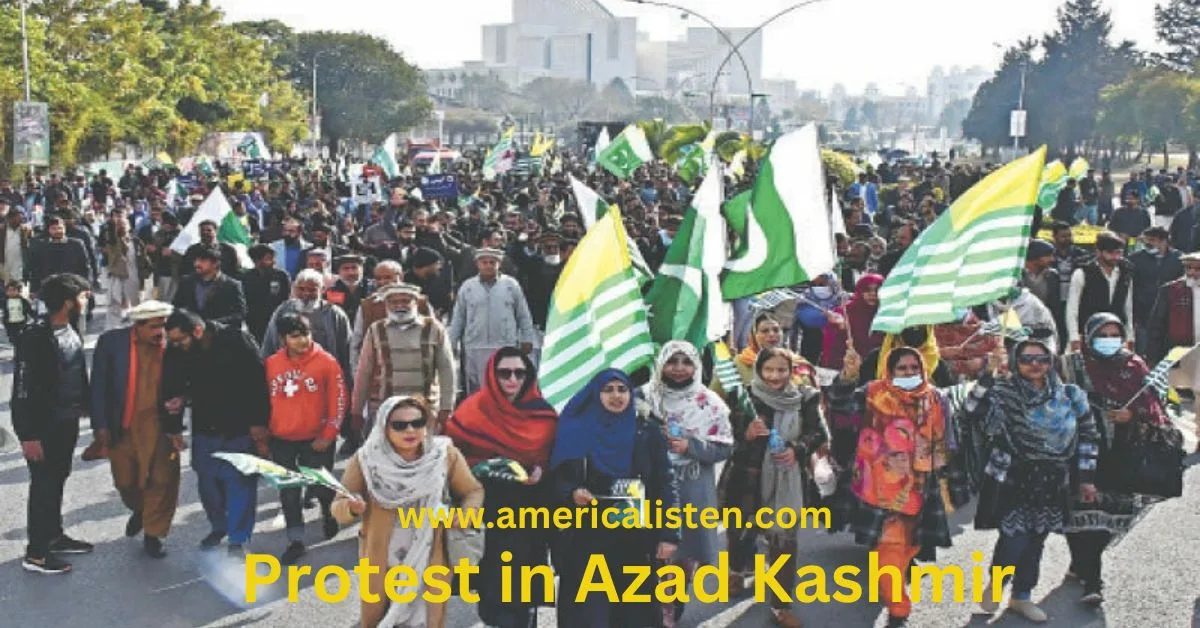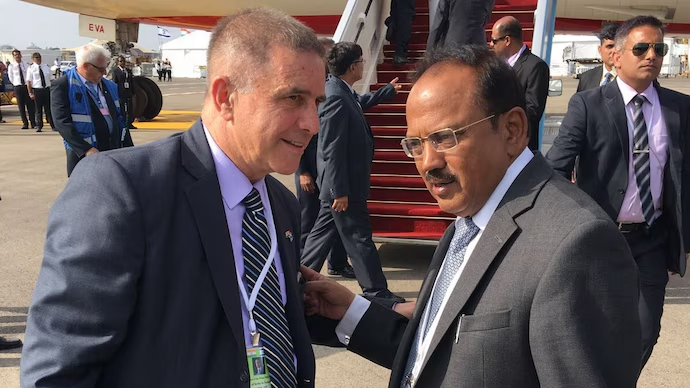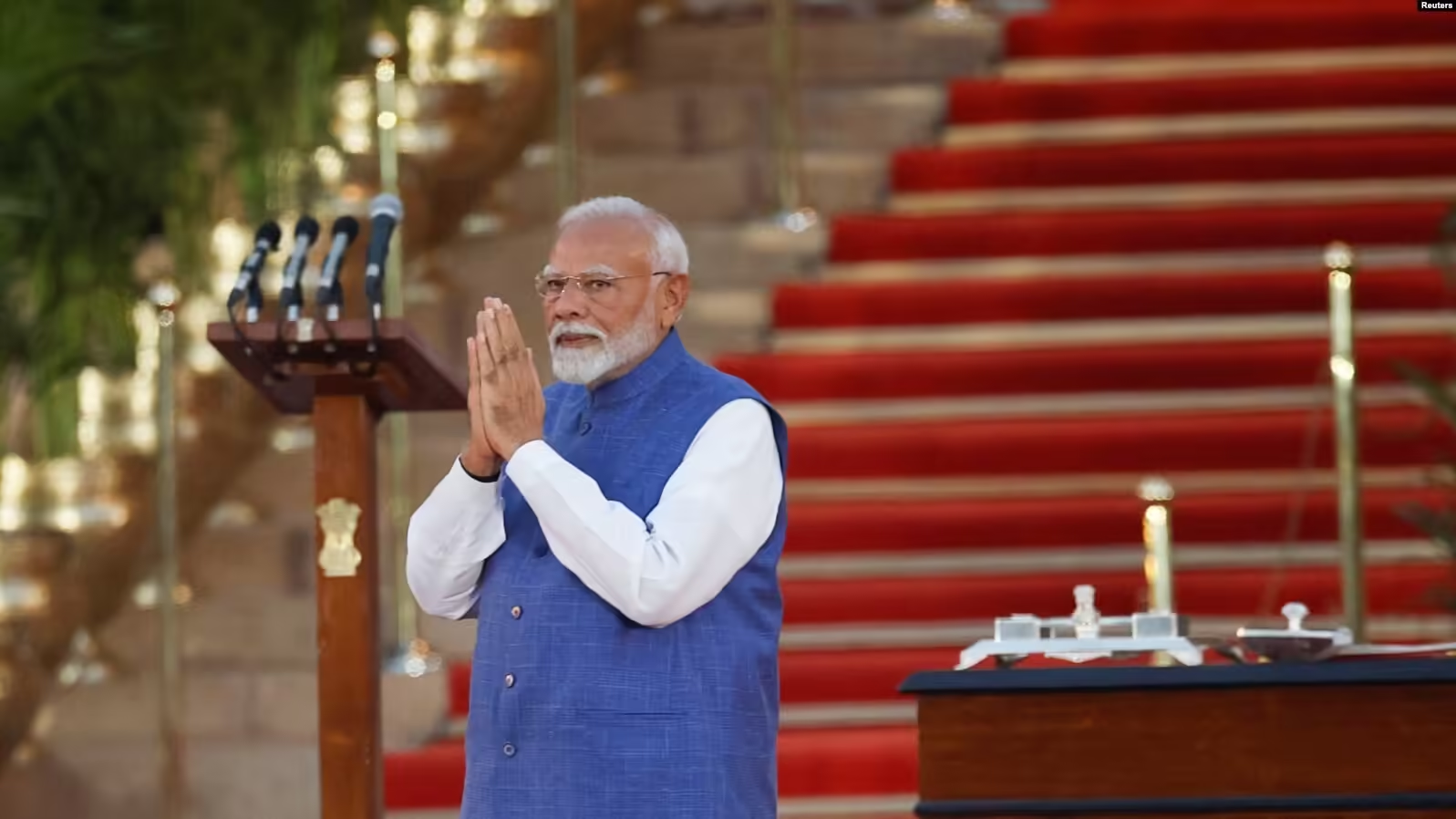Confrontations erupted between law enforcement and demonstrators in Muzaffarabad when police attempted to forcefully reopen shops that traders had closed in response to the arrest of their colleagues and activists.
On Thursday, hundreds of protesters in Rawalakot and Muzaffarabad symbolically burnt their electricity bills and tossed them into the Neelum River. Similar protests sprouted in various towns across Azad Jammu and Kashmir (AJK).

A surprising twist unfolded on Friday as police filed First Information Reports (FIRs) against numerous influential members of the action committees, including trade leaders and councillors, across different AJK regions. The charges included “destroying electricity bills and inciting the public against the government.” Late on Friday night, police raided and disbanded sit-in camps in Bagh and Rawalakot, conducting additional searches at the homes of those named in the FIR in Muzaffarabad.
The news of these “overnight” raids quickly spread across social media, prompting traders to shutter their businesses and take to the streets, joined by other members of civil society on Saturday.

In Muzaffarabad, police were captured on video trying to compel traders to keep their shops open, but their efforts were futile. As a significant crowd gathered near their sit-in camp by the press club’s eastern side, they were confronted by substantial police forces that deployed tear gas and batons to disperse them.
This confrontation resulted in one police officer and several protesters sustaining injuries, but they eventually managed to regroup at their sit-in camp, where they remained until 4 pm. In various parts of the city, enraged protesters blocked roads, set up barriers, and lit tires while chanting anti-government slogans.
In the Plate neighborhood, demonstrators clashed with police, as seen in a viral video where officers were seen fleeing the area.
Speaking to reporters at the sit-in camp, Shaukat Nawaz Mir, the elected president of Muzaffarabad’s traders, expressed bewilderment over the police’s filing of FIRs and house raids without search warrants. He affirmed their commitment to maintaining a peaceful sit-in.
In a later video message, he revealed that he had appealed to AJK Prime Minister Anwarul Haq earlier in the day for the immediate and unconditional release of all detainees, emphasizing that this was crucial for improving law and order in the region. Mr. Mir questioned the advice being given to the prime minister, suggesting that someone else might be influencing his decisions.
He mentioned that the core committee of all action committees would convene on Monday to formulate a unified list of demands to present to the prime minister, adding that if the government didn’t prioritize peace, they would pursue their own course of action.
In Rawalakot, thousands of people held a protest rally on Saturday, calling out the government and administration while businesses remained closed. Demonstrators re-established their sit-in camp near Kutchery Chowk, which the police had dismantled the previous night.
In Abbaspur, hundreds rallied and encircled the police station building where some activists had been detained. In Neelum Valley, a rally ended with hundreds of electricity bills being set on fire as part of a shutter-down strike. Local police booked several individuals for this act.
Meanwhile, DIG Police Poonch Shehyar Sikander confirmed the apprehension of 30 individuals from Rawalakot, Hajira, Abbaspur, and neighboring areas of Poonch district, as well as three each from Bagh and Sudhnoti districts.
In Muzaffarabad, Divisional Commissioner Adnan Khurshid disclosed that of the 25 detained activists, three were taken into custody overnight, seven in the morning, and the rest later on Saturday.
Unhappiness Among the People of Azad Kashmir with Pakistan
Azad Kashmir, a region nestled in the northern part of the Indian subcontinent, has long been a subject of complex political and social dynamics. While it enjoys a special status within Pakistan, with its own president and prime minister, discontent among the local population has been simmering. In recent years, there has been growing unhappiness among the people of Azad Kashmir regarding various aspects of their relationship with Pakistan.

One of the key reasons behind the dissatisfaction among the people of Azad Kashmir is the perception that their political autonomy is limited. Although they have their own legislative assembly and government, they argue that Islamabad still exerts significant control over the region’s affairs. This has fueled calls for greater self-governance and decision-making power.
Allegations of human rights abuses and restrictions on civil liberties have been raised by some residents of Azad Kashmir. Critics claim that dissent is often suppressed, and there are concerns about the freedom of speech and assembly. These human rights issues have contributed to a sense of frustration and a desire for change.
Economic development in Azad Kashmir has not matched the region’s potential, according to many locals. They argue that the ongoing conflict over Kashmir, which involves both India and Pakistan, has hindered investment and economic growth. Unemployment and underdevelopment have left many feeling that their economic prospects are limited.
While the desire for complete independence from both India and Pakistan has historical roots, it has gained traction in recent years. Some residents believe that an independent Kashmir would provide them with the autonomy and self-determination they seek. They argue that independence could pave the way for a more prosperous and stable future for the region.
A desire for regional stability also underlies some of the discontent among the people of Azad Kashmir. The ongoing conflict over Kashmir has been a source of tension between India and Pakistan, and many residents believe that achieving some form of resolution or independence for their region could contribute to overall regional stability.
The unhappiness among the people of Azad Kashmir with Pakistan is a complex issue driven by a mix of political, economic, and social factors. While some desire greater political autonomy and human rights protections, others advocate for complete independence. The situation highlights the importance of addressing the grievances of the local population and seeking a peaceful resolution to the broader Kashmir conflict that takes into account the wishes of all stakeholders.
Legal experts caution the government
In Mirpur, the AJK Bar Council convened an emergency meeting led by its Vice-Chairman Muhammad Nadeem Khan. Expressing grave concern over the filing of cases and arrests of peaceful action committee members, the bar council members asserted that peaceful protests were a fundamental democratic right, and any oppression of peaceful protesters by the state was unacceptable.
They issued a warning to the government, emphasizing that peaceful public protests could escalate into violent movements. They called for the release of detainees within 24 hours and the dismissal of all charges against them.
It should be noted that the people of the Poonch division had been staging a series of protests since June, primarily over the alleged scarcity of subsidized wheat flour. The introduction of a new power tariff in August intensified the wave of public anger across the region, leading to shutdowns, strikes, and demonstrations.
These demonstrators, who later formed people’s action committees in each district headquarters, incorporated additional region-specific demands into their agenda, including concerns about environmental issues related to the diversion of the Neelum River in Muzaffarabad and the incomplete Rathoa-Haryam Bridge, along with the issue of raising the Mangla Dam.”
Why People of Azad Kashmir Aspire for an Independent Kashmir
Introduction
Azad Kashmir, often referred to as Pakistan-administered Kashmir, is a region located in the northern part of the Indian subcontinent. It shares borders with India to the east, China to the north, and the Pakistani provinces of Punjab and Khyber Pakhtunkhwa to the south. For decades, the people of Azad Kashmir have voiced a desire for an independent Kashmir, distinct from both India and Pakistan. This article explores the reasons behind their aspiration for an independent Kashmir.
Historical Context:
The origins of the Kashmir conflict date back to the partition of British India in 1947. When the princely state of Jammu and Kashmir was given the choice to join India or Pakistan, its then-Maharaja Hari Singh chose to accede to India. This decision led to a conflict that continues to simmer to this day. Azad Kashmir, a part of the larger Kashmir region, was administered by Pakistan following the First Kashmir War in 1947-48.
Historical Disputes:
One of the primary reasons for the desire for an independent Kashmir is the unresolved territorial dispute between India and Pakistan over the entire region. The Line of Control (LoC) separates Azad Kashmir from the Indian-administered part of the region. The people of Azad Kashmir argue that they have a historical and cultural connection to the land and want to see it united under their governance rather than divided between two nations.
Autonomy and Self-Determination:
The people of Azad Kashmir have often expressed a desire for greater autonomy and the right to self-determination. They believe that being part of Pakistan restricts their ability to make decisions about their own future. The aspiration for independence stems from the desire to have a say in their political destiny and to determine the course of their region.
Human Rights Concerns:
There have been allegations of human rights abuses and restrictions on civil liberties in Azad Kashmir, including limitations on freedom of speech and assembly. Some residents argue that independence would allow for better protection of their rights and greater political and social freedoms.
Economic Development:
Proponents of an independent Kashmir also argue that the region could achieve greater economic development and prosperity if it were free from the constraints of the ongoing conflict between India and Pakistan. They envision a peaceful and stable environment conducive to attracting investments and fostering economic growth.
Broader Regional Stability:
Many people in Azad Kashmir believe that an independent Kashmir could contribute to regional stability. The ongoing conflict over Kashmir has been a source of tension between India and Pakistan for decades, and resolving the issue through independence could potentially reduce tensions in the region.
Conclusion:
The desire for an independent Kashmir among the people of Azad Kashmir is deeply rooted in historical disputes, a yearning for autonomy, and concerns about human rights and economic development. While achieving independence in such a complex geopolitical environment remains a formidable challenge, it is essential to acknowledge and understand the aspirations and grievances of the people in the region. A peaceful resolution to the Kashmir conflict that takes into account the wishes of all stakeholders is crucial for lasting stability in South Asia.
to Know more about AZAD Kashmir please click HERE
You May like:
Lychee: Secret Power, The Exotic Fruit That Will Transform Your Health and Tantalize Your Taste Buds


